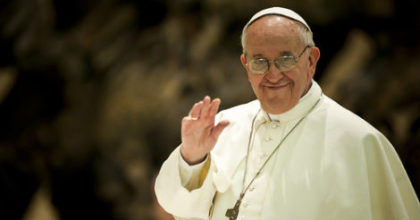
 )
)As my church background does not have a strong Lenten tradition, I decided to take a look at what Pope Francis has written about Lent in his annual messages for this season. Since he is a scientist and a theologian, I thought he would be a good point of reference. While the sermons are not primarily focused on science, a few themes related to science did emerge within a broader discussion of love, charity and compassion and other facets of the Gospel.
In several messages, Pope Francis encourages us to see the image of God in the people around us. In 2015, this was expressed through the idea of indifference and a concern that our personal comfort or stability makes it easier to ignore the suffering of others. The practice of fasting as well as being in community with others can in different ways guard against becoming indifferent. His 2016 message includes a warning against allowing “technoscience” to “reduce man to raw material to be exploited.” I don’t read it as a condemnation of technology full stop, which would be more than a little strange for a message published on a web site. I think we are being reminded that by mediating our interactions with other people and by encouraging us to engage with other people on a quantitative basis, science and technology can make it seem as if only the quantifiable and digitally representable aspects of people are important. Instead, we can see others as gifts from God, for what a treasure it is to be able to glimpse the image of God every day whenever we encounter someone else.
A more recent theme is a concern for all of God’s creation, still including humans and also encompassing all living things and our environment. In the 2018 Lent message, wider harm is depicted as a consequence of our lack of charity for fellow humans. Pollution for example can be the result of indifference about the harm it will cause to others. This year’s message offers a positive counterbalance, reminding us that the redemption we have experienced in Christ can be shared or expressed by redeeming creation. Creation may be groaning, but it also looks forward to our restorative work, bringing things closer to the created order God intended. While not expressly discussed, science certainly has a role to play in that restoration. Through science, we can understand better what allows creation to flourish, we can identify where those conditions are not present, and we can create technologies that will eliminate detrimental circumstances and multiply beneficial ones.
Science is certainly not the only or even the most important lens for understanding Lent. I would encourage you to read one or more of the full messages to get a more complete perspective. I just wanted to see how science could be part of the conversation. Although it was just a small comment, I’ve particularly been thinking about how technology, even (especially?) technology meant to connect us, can have a dehumanizing effect. I am not prepared to announce specific changes, but I do want put some thought this season into how to increase personal interaction and mitigating the negative effects of technology.
Does your Lenten practice involve changes in technology use? What steps do you take, during Lent or otherwise, to remember the humans on the other end of your devices?
Andy has worn many hats in his life. He knows this is a dreadfully clichéd notion, but since it is also literally true he uses it anyway. Among his current metaphorical hats: husband of one wife, father of two teenagers, reader of science fiction and science fact, enthusiast of contemporary symphonic music, and chief science officer. Previous metaphorical hats include: comp bio postdoc, molecular biology grad student, InterVarsity chapter president (that one came with a literal hat), music store clerk, house painter, and mosquito trapper. Among his more unique literal hats: British bobby, captain’s hats (of varying levels of authenticity) of several specific vessels, a deerstalker from 221B Baker St, and a railroad engineer’s cap. His monthly Science in Review is drawn from his weekly Science Corner posts — Wednesdays, 8am (Eastern) on the Emerging Scholars Network Blog. His book Faith across the Multiverse is available from Hendrickson.

Leave a Reply